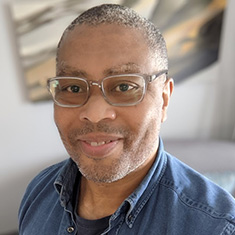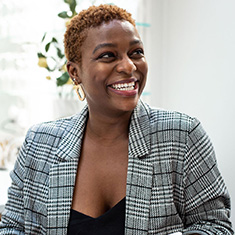Multicultural Reunion Q&A with Robert Quashie ’86 and Opeyemi Awe ’15
 Robert Quashie ’86
Robert Quashie ’86
September 16, 2021 — Grinnell College’s Multicultural Reunion 2021 will take place virtually Nov. 11-14, presenting a connected, inclusive, and engaging series of events for alums from across spectrums of race, ethnicity, sexual orientation, gender expression, spiritual belief, and ability.
A 21-member Multicultural Alumni Weekend Planning Committee has been working for the better part of a year to plan an array of events, speakers, and activities. Robert Quashie ’86 and Opeyemi Awe ’15 are serving as the committee co-chairs.
Quashie has lived in Chicago for most of his life. An English major at Grinnell, Quashie worked primarily in marketing and communications but has shifted to project management and operations in recent years. He’s currently the senior vice president of operations for a major medical association.
 Opeyemi Awe ’15
Opeyemi Awe ’15
Awe is a D.C. Posse Scholar who served as Student Government Association president and was awarded a Watson Fellowship during her Grinnell days. An international affairs major originally from Nigeria, Awe recently moved to Chicago. She is engaging in public and private work related to health.
Earlier this week, Quashie and Awe answered questions about Multicultural Reunion 2021.
Why was it important to you to become involved in the Multicultural Alumni Weekend Planning Committee? What made you decide to serve as co-chair this year?
RQ: I was recruited to the committee by a classmate, Rhonda Stuart ’86 [the 2017 Multicultural Reunion chair], and I thought it was a good way to build community with a diverse group of alumni who shared the common experience of being on our campus when who they were, put them somewhat outside the norm.
OA: I was very active at Grinnell while I was a student but being away for the last few years has shifted my perspective about my time there. My Grinnell education laid an important professional foundation for me and brought into my orbit many of the people I love most in the world. I have complex feelings about the institution. Instead of ignoring those complex feelings, I thought it could be interesting to process it in community. Plus, when I heard Robert would be co-chair, I knew it would be a good time.
I believe you both attended the 2019 Multicultural Reunion (and maybe the 2017 one as well). What were your favorite elements of those events?
RQ: I didn’t really attend my own class reunions until later. I attended the most recent Black alumni reunion along with the two multicultural events. To be honest, for years I had an ambivalent relationship with Grinnell based on what I’d gained but also some of what I'd encountered. You were there for your own education but also there as part of, you could say, a social experiment. Reconnecting through the multicultural reunions actually allowed me to connect with others who’d shared the same kind of dual-track experience across a lot of different dimensions: race, gender, expression, ability, and ethnicity. I really enjoyed getting to introduce chef Michael Twitty as the keynote speaker in 2019. We talked about his experiences learning food ways in Ghana, where I have paternal roots.
OA: I didn’t always believe it when people said that there is something unique about how Grinnellians view the world but attending the multicultural reunion definitely reminded me of that. Navigating Grinnell as folx with so many unique identities just gives us a distinct way of solving problems and a special kind of commitment to challenging the status quo. It was fun to see how people held strong to their Grinnellian ideals despite professions, time, geography, etc.
This year’s Multicultural Reunion theme is Reimagining our Grinnell Narrative. Could you explain why that theme was chosen and how it will be weaved into various activities during those four days?
RQ: First, it was something we chose as a collective. We tried hard not to privilege one group’s considerations over all others. We wanted to find a common theme that didn’t wash out our identities. Considering, recalling, and reimaging our narratives as groups and as individuals, keeping in mind that many of us, if not all of us, are intersectional in some way, created space for us to not only speak, but hear each other and help construct new ways of understanding our relationships with Grinnell from the past and going forward. Speaking for myself, over time, I grew into being part of a Grinnell community that expands after you leave campus.
OA: Echoing what Robert said, I really loved Grinnell while I was a student. I quickly fell out of love as a young alum, especially after the Posse decision, and have spent the last few years exploring what’s next. This year’s theme is really an invitation for people to come as they are and consider the evolution of their relationship with Grinnell. If you loved it and found your place and friends – we welcome those stories. If your relationship has been more fraught – we welcome that as well. So, there’s no privileging an approach or trying to push a narrative, just eager to create space.
There’s usually pros and cons to having an in-person event moved to the virtual space. What are the advantages for this Reunion? Will there still be engagement opportunities that normally occur on campus?
RQ: We think this virtual event will allow more alums and students who may not have the time, resources, or inclination to attend a live event to participate. We hope it will allow people to participate in ways that may feel more comfortable – maybe I just want to listen, maybe I want to submit a story, maybe I just want to socialize. One of the things we hope we can facilitate in a virtual space is that dynamic we all experienced to some extent on campus of sometimes being with the group and sometimes being just with your people. Grinnell represents a common space that affected us all differently.
OA: Given that this year is an invitation to engage, we hope that the virtual format will be a low stakes opportunity to reconnect. Instead of having to navigate transportation, which can be challenging and prohibitive, the ease of turning on a laptop to connect with old and new friends in the comfort of one’s space can be really positive. Like an in-person event, it is still a choose- your-own-adventure experience. We will have so many new and creative virtual opportunities to memorialize this weekend.
What’s it been like working with each other as co-chairs to plan the third edition of Multicultural Reunion?
RQ: The committee is like yet another Grinnell community. By now I’ve known some of them for longer than the four years I was on campus. Ope has this incredibly sharp mind for frameworks, process, and structure. She embodies the angst that many of us feel that we may not have gotten in if we’d had to compete with the likes of more recent grads. It is fun to measure our difference beyond the obvious. We both grew up for big chunks in the United States, but we also have that Ghana/Nigeria thing going. Trust us, it’s way beyond who has the best jollof rice. Of course, it’s Ghana.
OA: Working with Robert has been so much fun. I love comparing the similarities and differences of our Grinnell experience as Black students from West African origins. I am impressed by his enduring commitment to ensure that Grinnell lives up to its potential in all ways from admissions practices to spending money on events like Reunion. He’s been a welcome face during my recent move to Chicago. I’ll settle this once for all the people who know what’s up. Nigeria jollof is the best. Ghana has some amazing things going on but the jollof, nah, Nigeria’s got that.
— by Jeremy Shapiro